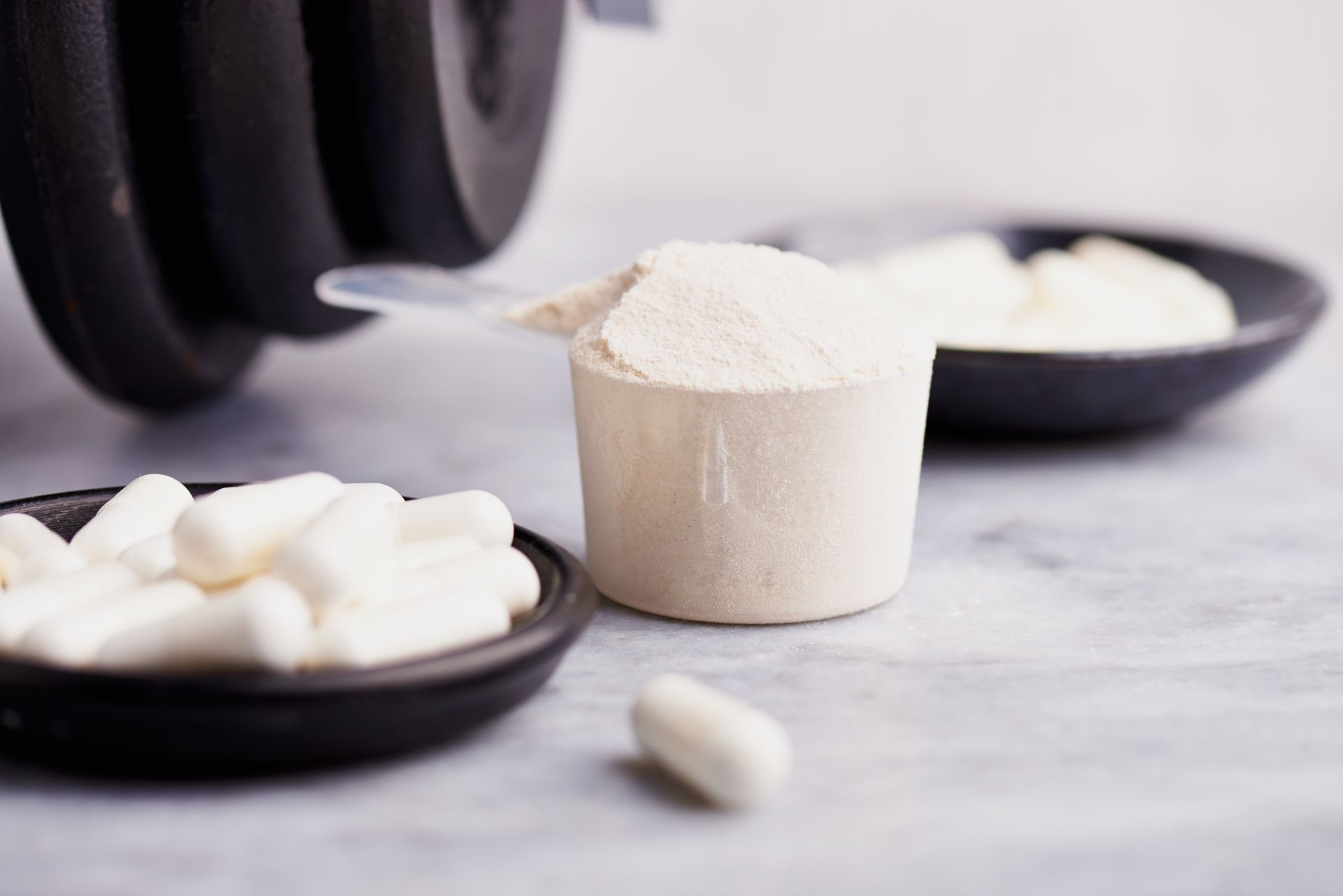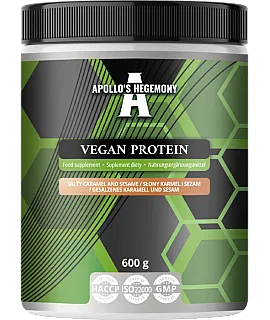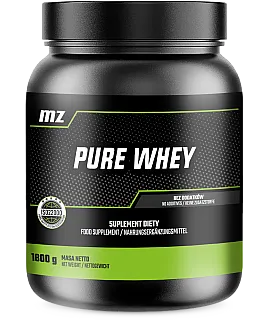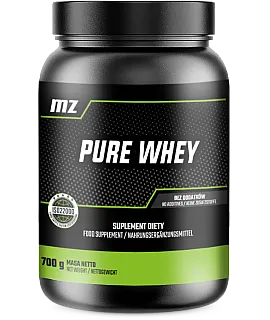How does protein nutrition work for muscle mass?

Building muscle mass is a goal often set by people who begin regular training at the gym. It is well known that an adequate amount of protein in the diet promotes the development of muscle mass, which is why many people turn to protein supplements. Let's find out exactly how protein nutrition affects muscle mass.
- How does muscle mass gain occur?
- How to develop muscle mass?
- Diet for muscle mass - what is worth knowing?
- Protein nutrient for mass - action.
- Protein conditioner for mass - when can it be helpful?
- Protein supplement for mass - how to use?
How does muscle mass gain occur?
Building muscle mass (otherwise known as muscle hypertrophy) refers to an increase in the cross-sectional area (size) of a muscle fiber or an entire muscle, mainly as a result of an increase in the size or number of myofibrils (i.e., bundles of protein fibrils that produce muscle contraction) within existing muscle fibers. Muscle mass gain depends on the difference between muscle protein synthesis (MPS) and muscle protein breakdown (MPB), also known as net protein balance (NPB) in muscle. For muscle growth to occur, the MPS rate must exceed the MPB rate, resulting in a positive NPB. Mechanical loading of skeletal muscle, usually achieved through regular strength training, and elevated blood amino acid concentrations following dietary protein intake, stimulate MPS and contribute to a positive NPB. These two factors also work together, as strength exercise significantly increases MPS, but also increases MPB. Ingestion of amino acids, especially exogenous amino acids (essential for the human body) after strength training, on the other hand, inhibits MPB and increases MPS.
How to develop muscle mass?
Strength (resistance) exercises are the most effective form of training aimed at developing muscle mass. Research suggests that they should be performed in the range of 10-20 series per muscle group per week, although some people may experience significant muscle mass gains when they perform fewer series per week. How much muscle a person gains in response to a strength training program is influenced by factors such as age, genetic predisposition, training experience and lifestyle, namely diet, supplementation, sleep and stress management. The amount of muscle mass gain in response to regular strength training decreases with age and training experience. This means that beginners gain muscle mass much faster than trained individuals with long training experience.
Diet for muscle mass - what is worth knowing?
A moderately positive energy balance (i.e., caloric intake with diet greater than energy expenditure) combined with regular strength training has been shown to result in muscle mass gain. To maximize muscle mass development, protein intake should range from 1.6 to 2.2 grams of protein per kilogram of total body weight per day (g/kg bw/d). Ideally, total daily protein intake should be divided into several meals containing between 0.4 g and 0.55 g/kg bw per serving. In practice, this means that eating 4-6 meals every 3-4 hours, each of which will provide 30-45 g of protein, will work best. A total daily carbohydrate intake of at least 3-5 g/kg bw/d is recommended, while fat intake should be between 20% and 35% of total energy intake, or about 0.5-1.5 g/kg bw/d.

Protein nutrient for mass - action.
Protein nutrients have been classified by the Australian Institute of Sport in category A, which includes only substances with well-documented effects in sports. We are mainly talking about whey protein (mainly whey protein concentrate - WPC and whey protein isolate - WPI), casein and vegetable protein (such as soy protein isolate). The results of a meta-analysis of 49 randomized controlled clinical trials (RCTs) with a total of 1,863 participants showed that regular use of a protein nutrient for mass over a period of at least 6 weeks combined with systematic strength training significantly increases in healthy adults:
-
maximal muscle strength by an average of 2.49 kg (maximum load for one repetition - 1 RM),
-
lean body mass by an average of 0.30 kg,
-
muscle fiber cross-sectional area (muscle size) by an average of 310 µm2,
-
cross-sectional area of the medial femur (muscle size) by an average of 7.2 mm2.
It is noteworthy that the effect of the protein nutrient used on muscle mass gain decreased with age (-0.01 kg) and was more effective in those who regularly strength-trained (0.75 kg). In contrast, protein nutrient for mass does not contribute to further muscle mass gain when total daily protein intake is greater than 1.6 grams per kg of total body weight in regular strength exercisers.
Protein conditioner for mass - when can it be helpful?
Protein conditioner for mass can be useful especially in the following situations:
- In the period immediately after weight training, when providing easily digestible and highly digestible proteins is a priority.
2. In cases where the meals or snacks consumed are low in protein (e.g. second breakfast at work, afternoon snack or snack before bedtime).
-
During temporary periods of lack of appetite as an alternative to whole foods and large volume meals.
-
When facilities for storing or preparing foods naturally high in protein are not available, and the availability of high-protein foods in local stores is severely limited.
-
During specialized weight loss programs in which a high protein intake is required in an energy-restricted diet to maximize maintenance of lean body mass.
-
During the period of body composition recomposition in beginners who have excessive body fat.
-
When traveling as a quick and easy-to-prepare form of meal that only needs to be mixed with water.
Protein supplement for mass - how to use?
Depending on an athlete's body size, daily energy requirements and specific physique goals, a protein nutrient for mass providing about 40 grams of protein per serving should meet the increased protein requirements of the vast majority of people training at the gym to develop muscle mass. Protein conditioner should be taken in the amount of 1.5-2 scoops so as to provide about 40 g of protein per meal.
Sources:
-
Morton RW, Murphy KT, McKellar SR, et al: A systematic review, meta-analysis and meta-regression of the effect of protein supplementation on resistance training-induced gains in muscle mass and strength in healthy adults. Br J Sports Med. 2018 Mar;52(6):376-384. https://pubmed.ncbi.nlm.nih.gov/28698222/
-
Wirth J, Hillesheim E, Brennan L.: The Role of Protein Intake and its Timing on Body Composition and Muscle Function in Healthy Adults: A Systematic Review and Meta-Analysis of Randomized Controlled Trials. J Nutr. 2020 Jun 1;150(6):1443-1460. https://pubmed.ncbi.nlm.nih.gov/32232404/
-
Nunes EA, Colenso-Semple L, McKellar SR, et al: Systematic review and meta-analysis of protein intake to support muscle mass and function in healthy adults. J Cachexia Sarcopenia Muscle. 2022 Apr;13(2):795-810. https://pubmed.ncbi.nlm.nih.gov/35187864/
-
Tagawa R, Watanabe D, Ito K, et al: Dose-response relationship between protein intake and muscle mass increase: a systematic review and meta-analysis of randomized controlled trials. Nutr Rev. 2020 Nov 4;79(1):66-75. https://pubmed.ncbi.nlm.nih.gov/33300582/
-
https://www.ais.gov.au/nutrition/supplements/group_a#isolated_protein_supplement
 ⮜ Previous article
⮜ Previous article
Creatine citrate - action and application.
 Next article ⮞
Next article ⮞


